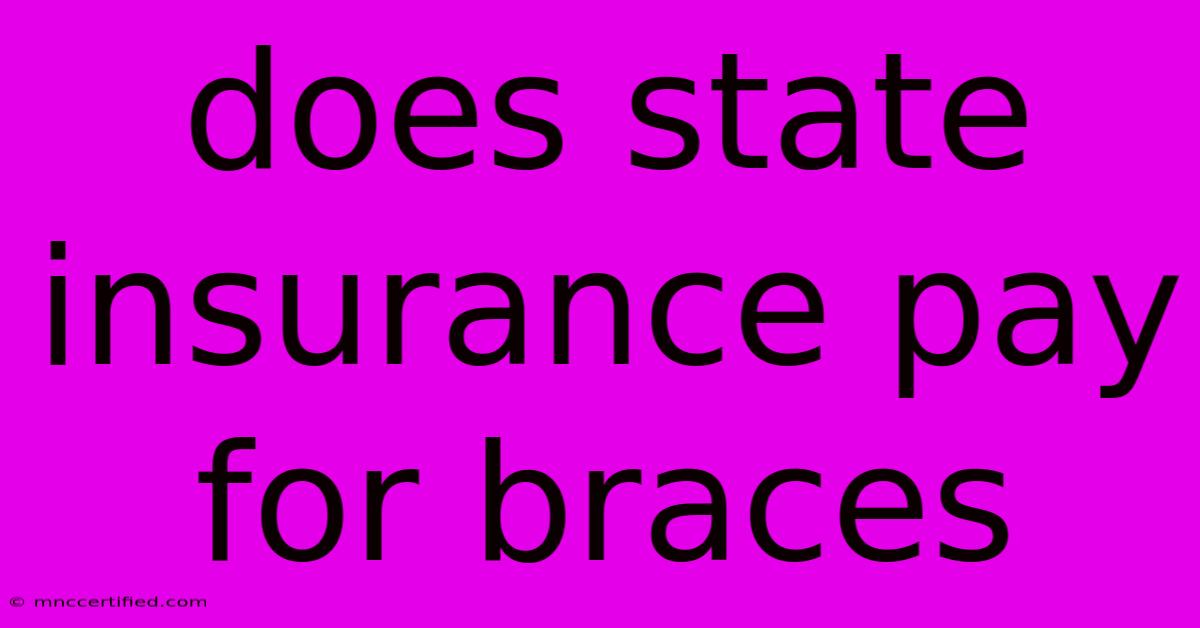Does State Insurance Pay For Braces

Table of Contents
Does State Insurance Pay for Braces? A Comprehensive Guide
Navigating the world of dental insurance can feel like a maze, especially when it comes to expensive procedures like braces. Many people wonder, "Does state insurance pay for braces?" The answer isn't simple. It largely depends on your specific state insurance plan, your age, and the type of orthodontic treatment you need.
Here's a breakdown of what you need to know about state insurance and braces:
Understanding State Insurance and Orthodontic Coverage
State insurance plans, also known as Medicaid, are government-funded programs designed to provide healthcare coverage to low-income individuals and families. While these programs offer essential medical services, the coverage for dental care, including braces, can vary significantly from state to state.
General Guidelines for State Insurance and Braces:
- Children's Coverage: Most state insurance programs offer some level of coverage for orthodontic treatment for children. This is often limited to necessary treatment for functional problems, such as misaligned bites affecting chewing or speech.
- Adult Coverage: Coverage for adult braces is generally limited or nonexistent under state insurance plans.
- Eligibility Requirements: You must meet specific eligibility requirements to qualify for state insurance and any associated dental benefits. These requirements typically include income levels, family size, and residency status.
- Specific Plan Variations: The exact coverage for braces within state insurance programs can differ even within the same state. It's essential to check your individual plan details and contact your state's Medicaid office for the most accurate information.
How to Find Out if Your State Insurance Covers Braces:
- Review Your Plan Documents: Carefully examine your state insurance plan's policy booklet. Look for sections related to dental coverage, orthodontic services, and any specific limitations.
- Contact Your State's Medicaid Office: Reach out to your state's Medicaid office directly. They can provide comprehensive details about your specific plan's coverage and eligibility criteria.
- Consult with Your Dentist: Your dentist is a valuable resource. They can help you understand your plan's benefits and guide you through the process of seeking approval for orthodontic treatment.
Exploring Alternative Options for Braces Coverage
If state insurance doesn't cover your braces, or if your coverage is limited, don't despair! Several other options exist to help you achieve a beautiful smile.
- Dental Payment Plans: Many dentists offer flexible payment plans to help patients manage the cost of braces over time.
- Financing Options: Look into third-party financing companies that specialize in medical and dental loans.
- Dental Discount Plans: Consider joining a dental discount plan. These plans provide access to reduced rates on dental services, potentially saving you money on braces.
- HSA/FSA Accounts: If you have a Health Savings Account (HSA) or Flexible Spending Account (FSA), you may be able to use pre-tax funds to cover orthodontic expenses.
Remember: When exploring these options, research carefully to find the most affordable and reputable providers.
Key Takeaway:
While state insurance may provide some coverage for braces, especially for children, it's crucial to understand the specific details of your plan. Don't hesitate to reach out to your insurance provider, state Medicaid office, or your dentist for clarification. With a little research and planning, you can find a solution to make braces more attainable.

Thank you for visiting our website wich cover about Does State Insurance Pay For Braces. We hope the information provided has been useful to you. Feel free to contact us if you have any questions or need further assistance. See you next time and dont miss to bookmark.
Featured Posts
-
Download Festival 2025 Lineup All Bands
Nov 13, 2024
-
Stop Smoking Pill Nhs Rollout And Benefits
Nov 13, 2024
-
Bears Coaching Change Brown Promoted
Nov 13, 2024
-
Wetherspoons Beer Change What You Need To Know
Nov 13, 2024
-
Rv Insurance Claim For Water Damage
Nov 13, 2024